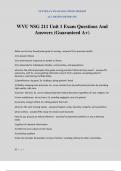©FYNDLAY EXAM SOLUTIONS 2024/2025
ALL RIGHTS RESERVED.
WVU NSG 211 Unit 1 Exam Questions And
Answers (Guaranteed A+)
What are the four broad/main goals in nursing - answer✔1) to promote health
2) to prevent illness
3) to treat human responses to health or illness
4) to advocate for individuals, families, communities, and populations
what are the ethical principles that guide nursing practice? What do they mean? - answer✔1)
autonomy- self; Ex. nurses getting informed consent from a patient, accepting patient's
decisions, maintaining confidentiality
2) beneficence- do good. Ex. holding a dying patient's hand
3) fidelity- keeping ones promises. Ex. nurse remains true to professional promise by providing
high quality, safe care
4) justice- fairness. Ex. nurse making impartial medical decisions regardless of race, religion, etc
5) non-maleficence- do no harm. Ex. avoiding negligent care of a patient
6) veracity- being truthful. Ex. telling patient full truth
what are the core nursing values - answer✔respect, unity, diversity, integrity, and excellence
what is ethics - answer✔the study of conduct and character
how do you process an ethical dilemma - answer✔1) determine whether or not a dilemma
exists
2) gather all relevant information
3) reflect on your values on the issues
4) verbalize problem
5) list and consider all possible courses of action- including referral to ethics committee.
1|Page
, ©FYNDLAY EXAM SOLUTIONS 2024/2025
ALL RIGHTS RESERVED.
6) select option that is in concert with the ethical principle that applies to the situation, the
decision maker's values and beliefs, and the profession's values for client care. be able to justify
in light of variables
7) evaluate the outcome
ANA code of ethics - answer✔applies to nurses in all healthcare settings. Primary commitment
is to patient. Demonstrates compassion and respect to inherent dignity, worth, and unique
attributes for all patients. Promotes advocates for, and protects the rights, health, and safety of
the patient. Has authority, accountability, and responsibility for nursing practice
what is primary prevention - answer✔involves strategies aimed at preventing problems. Ex.
immunizations, education, safety precautions, and nutrition counseling.
what is secondary prevention - answer✔includes the early diagnosis of health problems and
prompts treatment to prevent complications. Ex. vision screenings, Pap smears, BP screenings,
hearing testing, TB skin tests
what is tertiary prevention - answer✔focuses on preventing complications of an existing
disease and promoting health to the highest level. Ex. rehab, support groups, diet teaching, and
exercise programs
what is health assessment and what are the purposes? what does it include? - answer✔a health
assessment is gathering information about the health status of the patient, analyzing and
synthesizing that data, making judgments about nursing interventions based on the findings,
and evaluating patient care outcomes. Includes a health history and physical assessment. The
purpose of a health assessment is to gain further insight into current condition, establish
database for subsequent comparisons, identify patterns and trends to evaluate condition status
and assessment is a continuous part of the nursing process.
Health Insurance Portability and Accountability Act (HIPAA) - answer✔confidentiality for
patients
Americans with disabilities act (ADA) - answer✔1990; cannot discriminate based on disability
mental health parity act - answer✔(MHPA), 1996; lifetime coverage for mental health
patient self determination act (PSDA) - answer✔1990; patient has the right to decide
healthcare decisions for themselves
criminal law - answer✔crimes committed against an individual or society, innocent until proven
guilty beyond a reasonable doubt. Broken federal/state law. Ex. nurse gives lethal dose of
anesthetic, falsifying records
civil law - answer✔one individual sues another for money because of a perceived loss (Tort
Law). Guilty=more likely than not completed the action
2|Page
, ©FYNDLAY EXAM SOLUTIONS 2024/2025
ALL RIGHTS RESERVED.
what are the unintentional torts - answer✔1) negligence- the omission to do something that a
reasonable and prudent person in a reasonable situation would or would not do. (Prudent- the
average judgement, foresight, intelligence, and skill expected of a person of similar training or
experience) Ex. not doing order vital signs, not turning a patient, not changing a patient, etc.
2) malpractice (professional negligence)- failure of a person with professional training to act in a
reasonable and prudent manner. Ex.not checking NG tube before running it, etc.
what are the Quasi-Intentional torts - answer✔breach of confidentiality, and defamation of
character
what are the intentional torts - answer✔assault- behavior that makes a person fearful of harm
(threatens to restrain someone)
battery- intentional physical contact with a person that causes injury (purposefully putting a
larger IV)
false imprisonment- any unlawful confinement within fixed boundaries, can be physical,
emotional, or chemical (restraining to prevent leaving)
what is professional negligence - answer✔malpractice; most often prompts malpractice suits.
Ex. not following professional and established standards of care, not using equipment in
responsible manner, poor communication with patients, poor documentation of care provided,
failure to complete a prescribed procedure
liability - answer✔to be legally responsible by law.
Personal liability- every person is liable for his/her own conduct. Joint liability- nurse, physician,
and employing organization are liable. Respondent superior liability- "master is responsible for
the acts of his servants"
5 elements necessary to prove negligence - answer✔1) duty to provide care as defined by a
standard
2) breach of duty by failure to meet standard
3) foreseeability of harm
4) breach of duty has potential to cause harm (combines 2&3)
5) harm occurs
how to prevent professional negligence - answer✔know and follow the standards of care, and a
facilities polices and procedures, provide competent care, communicate appropriately,
developing a caring rapport, document everything, question authority, stay educated.
what is the nurses role in patients' rights - answer✔ensure patients understand their rights, and
protect their patients rights
3|Page




